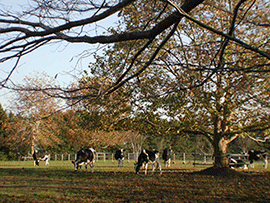For sustainable development of dairy farming, it is necessary to develop technologies that can both reduce greenhouse gases and improve productivity of dairy cows. In addition, it is important to improve embryo production and transfer technologies to improve the efficiency of beef production in Japan using dairy cows. We are developing technologies that contribute to these goals using a variety of research methods, including nutrition, physiology, biochemistry, microbiology, breeding, and reproduction.
Appropriate feeding systems are needed to reduce enteric methane emissions from dairy cows. To develop nutrient management technology, we are collecting data on oxygen consumption, carbon dioxide, and methane production through respiration tests on dairy cows, as well as calculating the digestibility of various feed ingredients through feed digestion tests.
Additionally, we aim to control the rumen microbiota by studying the "rumen", which is the digestive system of the dairy cow. In particular, we are focusing on the correlation between the intermediates produced by the rumen microbes and the microflora. By combining these respiration and digestion trials data with rumen microbiological examination, we can develop new and accurate feeding systems to reduce methane production.
We are also developing labor-saving feeding management programs to improve energy balance in lactation, taking into account genetic improvement for productivity, and developing technologies for selection of high-quality sperm and mass production and selection of high fertility embryos for effective Japanese beef production by embryo transfer to dairy cows.





